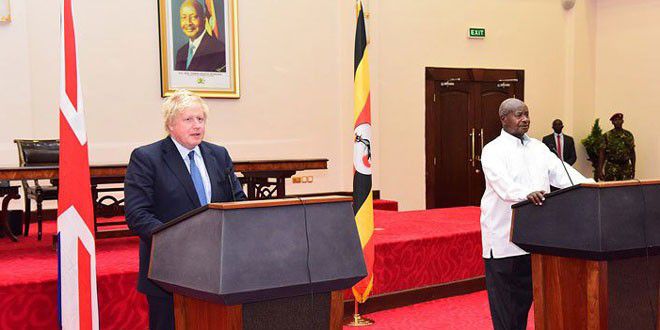UK’s Boris Johnson reveals clash with Museveni in new memoir
)
In his memoir, Johnson recounts his broader efforts to rally international support for Ukraine after Russia's invasion in February 2022.
While the United Nations General Assembly vote condemned Russia’s actions, with 141 countries in support of Ukraine, Johnson’s visit to Africa revealed a more complicated reality. Many African leaders, including Museveni, expressed lukewarm or ambiguous positions regarding the conflict.
Johnson describes his long-standing relationship with Museveni, calling him an “ancient bush fighter” who had played a crucial role in stabilising the region. Despite this, the two leaders found themselves on opposite sides when it came to the Russia-Ukraine conflict.
Johnson made an impassioned plea against Russian aggression during the Commonwealth summit, drawing on historical parallels of colonialism and imperialism, hoping to appeal to Museveni’s anti-imperialist stance.
However, Museveni rejected Johnson’s arguments, citing Uganda's pragmatic relationship with Russia.
"I made what I thought was a reasonable argument against the invasion, only to find that my old friend Yoweri Museveni, the president of Uganda, was raising his hand. ‘I do not agree with what Boris Johnson has said.’ Generally I got on famously with this merry-faced old fighter, who had helped overthrow the dictator Idi Amin," Johnson wrote.
"Over the years Museveni and I had happy discussions of Land Rovers and cattle farming, and he always seemed to me to have a sentimental interest in – if not quite allegiance to – the old colonial power... When it came to Putin and Ukraine, however, we were miles apart. He trotted out some of the Kremlin talking points: the nonsense about Nazis and terrorists in Ukraine, for instance."
When Johnson tried to frame the conflict as a colonial power violating the sovereignty of a newly independent state, Museveni responded bluntly: "Putin gives us weapons."

Johnson’s frustration is evident throughout the memoir. Despite the UK’s economic strength and cultural influence in Africa, he laments that Russia, along with China, has increasingly gained a foothold in the continent.
He notes that many African countries, including Uganda, find Russia’s non-interference in domestic politics and military support more appealing than the West’s emphasis on democracy, human rights, and issues such as LGBTQI rights.
The outcome of the Commonwealth summit was disappointing for Johnson. Despite his efforts to garner a united stance against Russia, the final communiqué largely ignored the war in Ukraine, instead focusing briefly on food shortages and inflation, issues that Russia has blamed on Western sanctions rather than its invasion of Ukraine. Johnson expressed his dismay at the failure to directly condemn Russian actions, calling it "infuriating."
Johnson’s memoir reveals his broader concerns about the waning influence of the UK in Africa. He highlights that while African leaders and people largely prefer to engage with the UK in areas such as trade and education, Russia’s “no-questions-asked” approach to military support has given it a strategic edge in the region. He concludes by suggesting that the UK should take a more proactive approach to engaging with Africa and leveraging the potential of the Commonwealth.
)
)
)
)
)
)
)